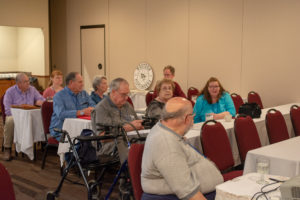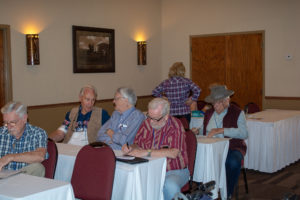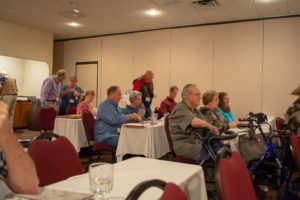On Day 2 we learned about Economics in the Old West, Weird Westerns, Legal Labyrinths (the “rights” side of the law), Women Professionals of the Old West, Other Markets for Western Writers — and my own Social Media panel seemed to go over well.
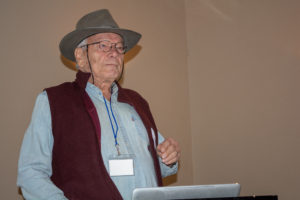
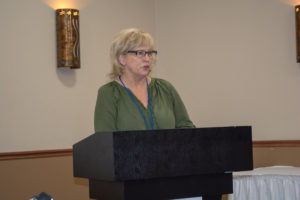
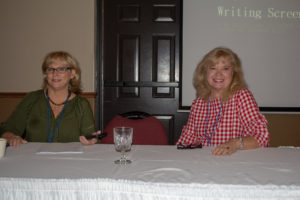
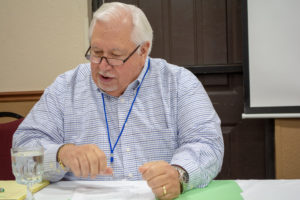
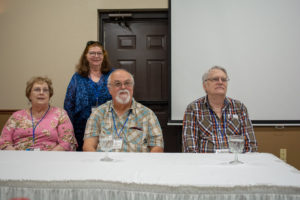
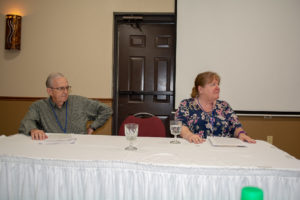
We’ve all been there: someone discovers you’re a writer, fixes you with a curious eye, and blurts out That Question.
Where do you get your ideas?
I usually say “www.ideas.com” and change the subject. Here are 10 more awkward questions you’ll hear – and how to respond.
- How much money do you make? I don’t know why, but people just assume writers a) all make what Stephen King makes and b) don’t mind talking about their salary. The best response here is a vague “Enough” and a quick change of subject.
- Will you read my novel? Or my friend’s or my relative’s or anybody else’s. The correct answer is “I’m sorry, but I just don’t have time.” If they seem serious, explain how they can go about finding a professional copy editor (and mention that those folks get paid for their hard work).
- Will you write a book with me/for me? Everybody has that One Great Idea … it’d make a fantastic book or movie. If only they had someone to help them write it, or to write it for them. If you’re truly interested in their idea, you can offer to help them (but don’t expect much out of someone who hasn’t actually sat down and tried to write on their own first). The better answer is “I’m sorry, but I just don’t have time.” You could explain how they can find a ghost writer if they seem serious (and mention that those folks get paid for their hard work).
- How do you get published? Here’s another would-be writer who’s never actually put any work or research into the craft. The polite answer is “You can find a ton of information on that subject on the internet and Writer’s Digest puts out a great book every year called ‘Writers’ Market’ to help you.”
- How are your books doing? People think this is expressing polite interest, even though it smacks of our first awkward question. The best answer is “They’re doing fine – have you bought your copy yet?”
- Is your book at the library? Most people have no idea how libraries (or bookstores) actually work. The best answer here is “I don’t know, but if you request a copy, they’ll get it for you.” You could also remind them to give you a review on Amazon and/or Goodreads once they’ve read it.
- Is your book on the bestseller list? Unless it actually is, the answer would be “Not yet, but if you buy a copy and tell all your friends to buy one, it might get there.”
- How do you find an agent? This one’s done a bit more work than the “How do you get published” questioner, but they’re still not applying themselves. The right answer is “Writer’s Digest puts out a great book every year called ‘Guide to Literary Agents.'”
- Have you been on any talk shows? Sometimes people equate “author” with “celebrity.” If they’re genuinely confused, you can politely remind them that most authors don’t get invited to talk shows. A good answer is “Not yet – how about you?”
- When will your book be made into a movie? Here’s another common misconception you might politely correct if you feel the need. The best answer is “I have no idea.”
And of course, you’re welcome to think up your own replies to “Where do you get your ideas?”
Here are a few of my favorites to start the New Year off. They’re in alphabetical order because I can’t really decide which are my ultimate favorites among them.
Books:
- Amelia Peabody series by Elizabeth Peters
- Almost anything by Andre Norton
- Dark is Rising series by Susan Cooper
- Almost anything by Edgar Rice Burroughs
- Holmes/Russell series by Laurie R. King
- Howl’s Moving Castle by Diana Wynne Jones
- Illusions by Richard Bach
- Kate Shugak series by Dana Stabenow
- Almost anything by Louis L’Amour
- Longmire series by Craig Johnson
- Navajo Tribal Police series by Tony Hillerman
- The People series by Zenna Henderson
- Spenser series by Robert B. Parker
- Time Enough for Love/Lazarus Long series by Robert Heinlein
- Watership Down by Richard Adams
Movies/TV:
For those of you who don’t know, Dragoncon is the largest science fiction convention in the US (ComicCon specializes in comic-type stuff while Dragoncon covers anything science fiction). They have a great Writer’s Track and two different workshops for writers during the con. This year, I opted for the Michael Stackpole/Aaron Allston workshop (with special guest Timothy Zahn). Here’s some of what I learned:

That “wall of books” at your local bookstore will be totally different by the time you write that “hot” book – don’t bother trying to catch the wave. “Evergreen” science fiction areas include epic fantasy, military science fiction, alternate history, time travel, and YA pet fantasies. Do your research and see what’s selling really well in an area you like to read and write about; find the five top authors and read their last two books. That will give you an idea of the best writing in that area. That’s what you have to measure up to! — Michael Stackpole, “Writing a Knock-Out Novel”
In another panel, “Writing in the Post-Paper Era,” Stackpole related a story about a time that he was signing books at a table next to Fred Saberhagen, one of his favorite authors. A young fan came up to him, nervous, and asked for an autograph. Stackpole turned to Saberhagen after the girl had walked away, and told him he’d been just as nervous meeting Saberhagen for the first time. “I just can’t believe anyone would be nervous about meeting me,” he said.
“She wasn’t here to meet you,” Saberhagen replied. “She was here to meet The Author.”
When presenting yourself on the internet, remember that your author persona must be different from your personal one. You are an entertainer. “This isn’t about real, genuine, and authentic – it’s about marketing,” Stackpole says. “Never tweet about failure!”
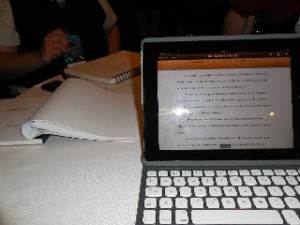
“Die, adjective, die!” – Aaron Allston, “Description.” Use only the perfect adjective or adverb. They may be efficient descriptions, but this is at the cost of emotional content. Go for the emotion.
“Written fiction is not a passive form of entertainment,” Allston says. “Engage the reader so that they participate.”
I’ll be sharing some specifics of the seminar over on the TWWS Blog at LiveJournal – see the links page to get there.
I also attended several fun panel discussions over in the Writer’s Track: “Fightin’ and Writin'” (John Ringo, Jim Butcher, Faith Hunter, John Robinson, Kevin Dockery, and Sabutai Musashi) and “Dyin’ Laughing” (Bill Faucett, C.L. Wilson, John Ringo, and Debbie Viguie). Here are some highlights:
“Get seven of your research experts drunk. Then put their arguments into your book. It writes itself!” – John Ringo on using expert advice as a research tool.
“You will be beat into the ground if you make a mistake,” says Kevin Dockery. “I’m talking about a decimal point.” (Ringo raises hand and nods vigorously) “The more technical you want to get, the better your references must be.”

Asked “Is combat sexy?” the panelists all stared at Dockery, who had an entire room at the Hyatt called “The Armory,” where he showed off a huge collection of weaponry. “Because I’m the butt,” he says, “I’m going to jump in first. I don’t find it sexy. There are situations where it’s more exciting, but long distance combat is mechanical and isolating. To me, it’s a machine.” (Ringo plays an imaginary violin)
In “Dyin’ Laughing,” Faucett asked the panelists why they kill off important characters. “I’m sick, evil, and twisted,” says Wilson.
“I kill off my fans,” says Viguie. “I use their names in my books for characters who die.”
“Never kill the pet!” John Ringo says. “Tom Hanks still hasn’t recovered from ‘Turner and Hooch.’ I did actually write one short story where nobody dies, though. I must have had pneumonia or something – and my stuff is sparkly rainbows coming out of unicorns’ asses compared to David Drake!”
